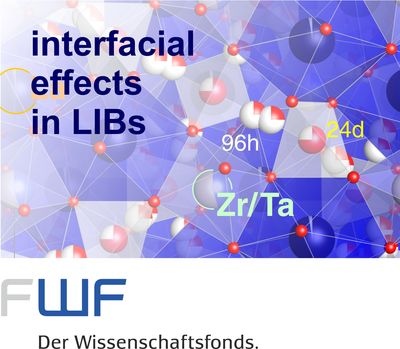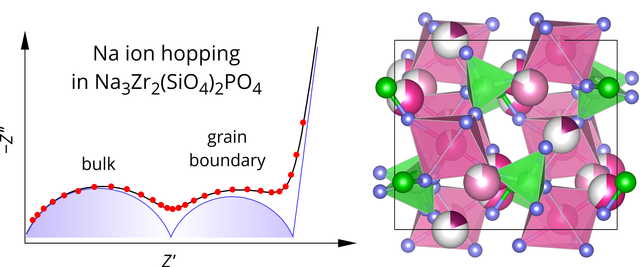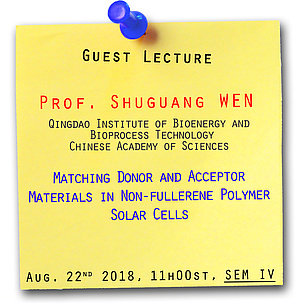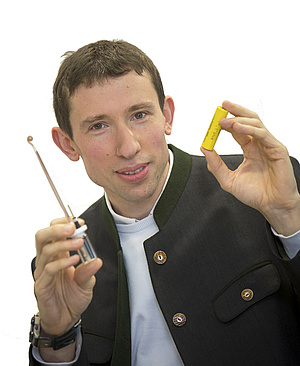
 Lead-free perovskites in photovoltaics
Lead-free perovskites in photovoltaics
A new paper about Rubidium antimony halides perovskites as photovoltaic material has been published recently. In this contribution the influence of varying the bromide to iodide ratio on the structural, optical and photovoltaic properties of Rb3Sb2Br9-xIx (x = 0 – 9) is systematically investigated. Rb3Sb2I9 is the best as absorber material displaying power conversion efficiencies of 1.37%. Moreover, the solar cell devices exhibit low hysteresis properties and are stable for more than 150 days stored under inert atmosphere.

 Habilitationspreis 2018
Habilitationspreis 2018
Dr. Daniel Rettenwander ist für seine Arbeit zur Co-Substitution in LLZO-Granaten mit dem GÖCh-Habilitationspreis 2018 ausgezeichnet worden. Herzlichen Glückwunsch vom ICTM!

 Award for S. Höfler and T. Rath!
Award for S. Höfler and T. Rath!
Sebastian Höfler and Thomas Rath received the 'Best Review Article Award' of Monatshefte für Chemie for their article "Progress on lead-free metal halide perovskites for photovoltaic applications: a review". The award ceremony took place on Nov. 8th in the framework of the general assembly of the Austrian Chemical Society in Vienna. Congratulations from ICTM!
 Congratulations to Dr. Christian Leypold
Congratulations to Dr. Christian Leypold
Oct. 31st: Christian defended his PhD-work entitled "Functional Organic Materials for High Energy Batteries: Soft Mixed Electron and Ion Conductors and Organics in Singlet Oxygen Electrochemistry" with excellence! Well done! Christian will now continue his work within the project OMICON for some month finishing a bunch of publications. ICTM once again congratulates and wishes him all the best for this endeavour.
 Anti-perovskites
Anti-perovskites
New paper in Chem. Mater. about structure and ion dynamics in Li-bearing antiperovskites. Thanks to Isabel and Sebastian for their great work to untangle some of the features of this sensitive compounds. We appreciate the help of A. Seneshyn and G. Redhammer from Munich and Salzburg. Link.
See also: https://twitter.com/WilkeningLab

 Congratulations to the Kodolitsch-twins!
Congratulations to the Kodolitsch-twins!
Based on their Master theses “Porous Organic Polymers as Matrix Materials for Optical Oxygen Sensors” and “Metal-organic frameworks with imidazole-carboxylate containing ligands” Elisabeth and Katharina Kodolitsch finished their studies on Oct. 22nd. Sincere congratulations from ICTM!

 New paper on supercapacitors
New paper on supercapacitors
To improve the performance of supercapacitors, a mechanistic understanding of ion electrosorption is required. In this work ICTM’s Christian Prehal and colleagues from the Institute of Inorganic Chemistry, the Montanuniversität Leoben and the INM Saarbrücken identify parameters like salt concentration, charging velocity or cell design, that control mechanisms of ion charge storage. Moreover, they show that charging initially leads to a non-equilibrium ion configuration even at extremely low cycling speed, followed by an increase of the total ion concentration, i.e. a charge-neutral equilibration. The work has been published in Nature Communications.
 Congratulations to DI Efthymia Vakalopoulou!
Congratulations to DI Efthymia Vakalopoulou!
Oct. 10th, 2018: Sincere congratulations to Efthymia Vakalopoulou for finishing her Master studies today! In the last months, Efthymia became mistress of polyHIPEs and today she escaped from the clutches and cavities of this kind of material. Her Master thesis is entitled "Ring Opening Metathesis Polymerization derived polyHIPEs with novel features". Very well done!
Efthymia thanks the Onassis foundation for providing her with a stipend.

 New paper on lead-free pervskite-type solar cells
New paper on lead-free pervskite-type solar cells
The Trimmel group just disclosed in a collaborative contribution the synthesis and characterization of the mixed-anion halogenobismuthate(III) (CH3NH3)6BiI5.22Cl3.78 (MBIC) as an alternative lead-free perovskite-type semiconductor, and discussed its optical, electronic, and photovoltaic properties. When stored under inert conditions, MBIC derived solar cells show an excellent long-term stability over the investigated period of more than 700 days. The article has been published in Inorganic Chemistry.
 Prof. Shuguang Wen gave a guest lecture
Prof. Shuguang Wen gave a guest lecture
Prof. Wen (Qingdao Institute of Bioenergy and Bioprocess Technology, Chinese Academy of Science) gave a guest lecture on Aug. 22nd 2018 entitled "Matching Donar and Acceptor Materials in Non-Fullerene Polymer Solar Cells".It was a pleasure to have him with us in Graz! Prof. Wen's group collaborates with Prof. Trimmel in the framework of an OeAD project.
 Stefan Freunberger has won the “2018 Tajima Prize” from The International Society of Electrochemistry for his work on oxygen electrochemistry.
Stefan Freunberger has won the “2018 Tajima Prize” from The International Society of Electrochemistry for his work on oxygen electrochemistry.
This year, the Prize has been awarded to Dr. Stefan Freunberger for his research on oxygen electrochemistry in non-aqueous batteries. Battery electrodes that make use of the redox activity of oxygen are widely considered the next major step in energy storage. In particular, Dr. Freunberger was honoured for obtaining a comprehensive understanding of oxygen reactions taking place in such battery electrodes using a range of in-situ spectroelectrochemical methods.

 Feature on Porous Materials @ Work
Feature on Porous Materials @ Work
The current research journal of Graz University of Technology just appeared.
Read the feature article entitled "Interior Architecture at the Nanoscale" written by Doris Griesser on the lead-project Porous Materials @ Work which will start on July 1st, 2018. Researchers from ICTM will take part in three sub-projects dealing with conductive MOFs and COFs, microporous sensing materials towards optical sensing of methane and the synthesis and application of nanoporous zinc sulfide.
 AGW: minigolf in Graz
AGW: minigolf in Graz
Trip with the workgroup (AGW) to play crazy golf (minigolf) in Graz. Stefan, thanks for the great organisation! We enjoyed dinner at clocktower. Looking forward to our next event.

 new FWF project, interfaces in batteries
new FWF project, interfaces in batteries
Daniel Rettenwander's proposal about interfacial effects in Li-based batteries has just been granted by the FWF. Together with the group of J. Fleig from TU Vienna and FELMI (Graz) electrochemical processes at interfaces in batteries will be studied. > 400 kEUR will now be devoted to explore ionic resistances and degradation processes to pave the way for next-generation batteries with ceramic electrolytes.

 Non-fullerene acceptors
Non-fullerene acceptors
The photovoltaics group at ICTM investigated the effect of the polymer molecular weight on the performance of PTB7-Th:O-IDTBR non-fullerene organic solar cells together with researchers from the University of Nova Gorica and the University of Oldenburg. Thereby it was found that the change in performance is not primarily governed by the charge carrier mobility or the crystallinity of the conjugated polymer. Instead, activation energy for charge transport, carrier concentration and recombination rate are identified to strongly affect the device characteristics.
 Microcontact impedance spectroscopy
Microcontact impedance spectroscopy
Microcontact impedance spectroscopy revealed a single Arrhenius behaviour of the bulk ionic conductivity in NASICON-based electrolytes; Daniel Rettenwander's study helps throw light on the complex interplay of synthesis history and transport properties in these electrolytes. See: Chem. Mater. 30 (2018) 1776.
https://twitter.com/WilkeningLab/status/988437609176272897

 NASICON solid electrolytes
NASICON solid electrolytes
In collaboration with FZ Jülich (group of F. Tietz) ICTM managed to separate bulk from grain boundary ionic resistance in well-known NASICON, being first described in the 70s by Goodenough and co-workers. See: Chem. Phys. Lett. 701 (2018) 147.

 Congratulations to Dr. Lukas Schafzahl
Congratulations to Dr. Lukas Schafzahl
March 23rd, 2018: Luki just passed his Rigorosum based on his PhD-work "Parasitic and Interphase Chemistries in Li-ion Batteries and Beyond" with excellence! Well done Dr. Schafzahl!
Luki will now continue his engagement at ICTM as Assistant Professor during the summer term 2018.
 Chemical recycling of natural rubber waste
Chemical recycling of natural rubber waste
 A team of researchers of ICTM disclosed the chemical recycling of natural rubber waste via a new degradation route allowing for a subsequent polymerization approach. Congratulations to Prof. Abbas and Max Neubauer for their great achievement!
A team of researchers of ICTM disclosed the chemical recycling of natural rubber waste via a new degradation route allowing for a subsequent polymerization approach. Congratulations to Prof. Abbas and Max Neubauer for their great achievement!
 Elucidation of the mechanism of carbonate decomposition in Li-oxygen batteries
Elucidation of the mechanism of carbonate decomposition in Li-oxygen batteries
 Nika Mahne and Stefan Freunberger, in collaboration with the University of California-Berkeley, uncovered the mystery of the absence of oxygen evolvement during the decomposition of lithium carbonate, which is of far reaching relevance for almost all Li battery cathodes. The results of this endeavor have just been published in Angewandte Chemie as a VIP-article. Congratulations!
Nika Mahne and Stefan Freunberger, in collaboration with the University of California-Berkeley, uncovered the mystery of the absence of oxygen evolvement during the decomposition of lithium carbonate, which is of far reaching relevance for almost all Li battery cathodes. The results of this endeavor have just been published in Angewandte Chemie as a VIP-article. Congratulations!
 New paper on lead-free perovskite solar cells
New paper on lead-free perovskite solar cells
 Because of the toxicity of lead halide perovskites, there is currently growing interest to study lead-free perovskite materials for photovoltaic applications. Germanium halide perovskites have well-suited properties, however, mainly due to stability issues of this material, the performance of germanium perovskite based solar cells remained low so far.
Because of the toxicity of lead halide perovskites, there is currently growing interest to study lead-free perovskite materials for photovoltaic applications. Germanium halide perovskites have well-suited properties, however, mainly due to stability issues of this material, the performance of germanium perovskite based solar cells remained low so far.
Recently, researchers at ICTM found that a modification of the chemical composition, in particular, the introduction of bromide ions into the methylammonium germanium iodide perovskite, leads to a significant improvement of the solar cell performance along with a slight enhancement of the stability of the germanium perovskite. The according publication appeared in ACS Applied Energy Materials.
 Best wishes for the start of the Master theses of Elisabeth Kodolitsch and Florian Gobec
Best wishes for the start of the Master theses of Elisabeth Kodolitsch and Florian Gobec
Feb. 26th, 2018: Elisabeth will do research on Olefin-Metathesis catalysts with cis-dichloro stereochemistry and Flo will work on novel clickable ligands for MOFs. All the best for their research!
 Congratulations to Bettina Schafzahl!
Congratulations to Bettina Schafzahl!
Feb. 23rd 2018: Bettina defended her PhD thesis entitled "The Aprotic Li-O2 Battery - Fighting the Detrimental Impacts of Oxygen" with excellence! Well done Dr. Schafzahl!
Betti will now continue her engagement at ICTM as Assistant Professor during the summer term 2018.
 Warm welcome to Efthymia Vakalopoulou
Warm welcome to Efthymia Vakalopoulou
Feb. 7th, 2018: Efthymia will pursue research on emulsion templated elastomeric polymer-foams in the framework of a Master's thesis.
 ICTM welcomes Katharina Kodolitsch
ICTM welcomes Katharina Kodolitsch
Feb. 1st 2018: Katharina will do her Master's thesis on novel linker-systems for metal organic frameworks.
 Congratulations to Julia Raunicher
Congratulations to Julia Raunicher
Julia finished her Master studies by defending her thesis entitled "Latex blends - influence of the blending ratio on the mechanical properties" on Jan. 30th 2018. Well done Julia - congratulations!
 Paper on advancing the analytics of batteries
Paper on advancing the analytics of batteries
Researchers of ICTM disclosed an accurate and integral quantification of carbonaceous species and peroxides or superoxides in battery electrodes by refining and advancing previous procedures. Congratulations to Bettina, Eleonore, Lukas, Yann and Anjana for their conscientious pieces of work making this methodological paper possible!





